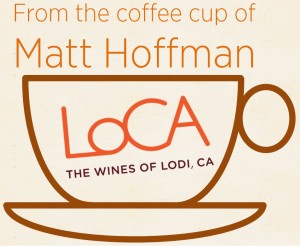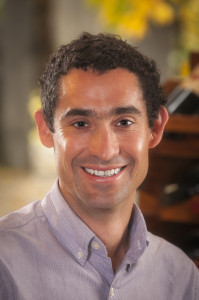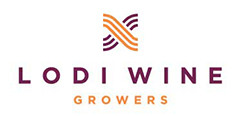 I’d like to take this opportunity to introduce myself. In October, I was hired as the new Grower Program Coordinator and am responsible for viticulture research, grower outreach, and the Lodi Rules for Sustainable Winegrowing certification program. My first five months at the LWC have been productive, and I have received much support and positive feedback from the LWC staff, Board of Commissioners, Lodi Rules Committee, and the Research, Education, and Communication Committee. It is a privilege to apply myself in Lodi and I look forward to working with and for you.
I’d like to take this opportunity to introduce myself. In October, I was hired as the new Grower Program Coordinator and am responsible for viticulture research, grower outreach, and the Lodi Rules for Sustainable Winegrowing certification program. My first five months at the LWC have been productive, and I have received much support and positive feedback from the LWC staff, Board of Commissioners, Lodi Rules Committee, and the Research, Education, and Communication Committee. It is a privilege to apply myself in Lodi and I look forward to working with and for you.
 While most of my counterparts have focused their education and training on the science of viticulture, my expertise lies in the science behind how grower organizations, like the LWC, can design research and outreach programs to best serve growers. I bring this training to bear on my work of providing Lodi growers with opportunities to continually learn and advance their understanding about vineyard management. After all, the context in which we grow winegrapes is constantly changing. Our knowledge about vineyard management must adapt to these changing times.
While most of my counterparts have focused their education and training on the science of viticulture, my expertise lies in the science behind how grower organizations, like the LWC, can design research and outreach programs to best serve growers. I bring this training to bear on my work of providing Lodi growers with opportunities to continually learn and advance their understanding about vineyard management. After all, the context in which we grow winegrapes is constantly changing. Our knowledge about vineyard management must adapt to these changing times.
I earned my B.S. in pomology with a focus on viticulture from Cal Poly, San Luis Obispo and went on to earned a M.S. from Iowa State University’s Rural Sociology Program and the Graduate Program in Sustainable Agriculture. I later entered a Ph.D. program at UC Davis where I was involved in a research project you may be familiar with.
My UC Davis colleagues and I conducted the 2011 Lodi Winegrape Grower Survey and the 2013 Lodi Winery Survey. The LWC was instrumental in the success of this landmark study, and the results have been published in Practical Winery and Vineyard[1], the LWC’s IPM newsletter[2] and the Center for Environmental Policy and Behavior’s series of Research Briefs[3]. The Lodi surveys were part of a larger California-wide study of winegrape grower and winery manager adoption of sustainability practices, the effectiveness of local grower organizations (including the LWC) at achieving various goals, and the role social networks of knowledge sharing among growers, winery managers, and outreach professionals play in learning about vineyard and winery management.
A wealth of insight was drawn from these surveys, but one in particular inspires my confidence in the LWC. As you know, one of our chief objectives is to promote grower adoption of viticulture practices that balance environmental, social, and economic goals through research and outreach[4]. The LWC’s programs are indeed effective at achieving this goal. Among Lodi growers, we found that on average, the more a grower participates in activities (such as breakfast meetings, field days, and self-assessments), the more likely they are to implement sustainability practices (those in the Lodi Winegrower’s Workbook). See Figure 1. While practice adoption is not a definitive measure of success, it signals that the LWC has indeed supported growers through the process of innovation.
The LWC’s programs, beginning with the IPM program, the BIFS program, the Sustainable Winegrowing Program, and the Lodi Rules, are widely recognized throughout California viticulture and U.S. agriculture, as among the most innovative and successful research and outreach programs. This is a tradition Lodi growers can be proud of, and one that I am eager to build upon. I look forward to working with you to meet the ever changing demands of winegrape growing.
I hope you enjoy reading this newsletter as much as I have enjoyed writing it for you. The articles I have prepared are only the tip of the iceberg of the work being done at the LWC. Please consider my door open, and I look forward to meeting you in person soon.
[1] Hoffman, Lubell, Hillis. 2011, Spring. “Defining Sustainable Viticulture from the Practitioner’s Perspective. Practical Winery and Vineyard. http://environmentalpolicy.ucdavis.edu/files/cepb/Hoffman_Defining-2011_0.pdf
[2] Hoffman, Hillis, and Lubell. 2012. “2011 Lodi Winegrape Grower Survey: Report of Results”. Lodi Winwegrape Commission IPM Research Newsletter. http://environmentalpolicy.ucdavis.edu/files/cepb/IPM_Newsletter_0.pdf
[3] CEPB. Sustainable Viticulture: Practice Adoption and Social Networks. http://environmentalpolicy.ucdavis.edu/project/sustainable-viticulture-practice-adoption-and-social-networks
[4] Lodi Winegrape Commission. “Mission Statement”. http://www.lodiwine.com/mission-statement

